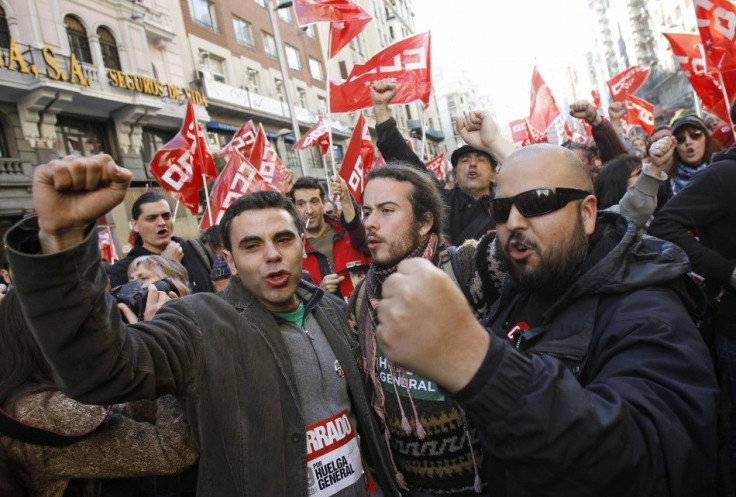Spain Disrupted By General Strike Against Government's 'Very, Very Austere Budget'

A general strike in Spain that was called to protest government spending cuts disrupted the recession-hit country on Thursday, one day ahead of a cabinet meeting expected to pass what Prime Minister Mariano Rajoy described as a "very, very austere" budget.
Many flights were canceled, the public transportation network was brought to a near-standstill, and manufacturing was all but halted, as unions battled government attempts to pass some of the deepest budget cuts the country has seen.
Some observers suggest the cuts to be approved Friday could be equal to approximately 3.2 percent of Spain's gross domestic product.
The strike marks the first large-scale protest against Rajoy's government, which has been in power for just four months, after the center-right People's Party won a general election that ended seven years of Socialist rule.
Unions also protested a package of labor market reforms that would make it easier for Spanish employers to fire workers and reduce the role of organized labor by changing the nationwide system of collective bargaining.
According to Spanish union sources quoted by newspaper El Pais, more than three-quarters of the country's workers took part in the protest, and as many as 97 percent of manufacturing workers went on strike.
Reuters reported that scuffles broke out during a huge protest march in Madrid. Police had arrested 58 people on Thursday.
New Government Presses On
Rajoy is determined to go ahead with the budget cuts anyway.
"Regardless of whether [the general strike] is considered a success or failure, the government is not going to alter the reform one jot," economy minister Luis de Guindos said.
As a result of the strike, Spain's biggest airline, Iberia, is cancelling 222 flights Thursday, 60 percent of its schedule.
Spanish public spending in 2012 will be cut by around €35bn, in an attempt to meet European Union deficit reduction targets for the year. Rajoy wants to reduce Spain's public sector deficit from its current level of 8.5 percent of GDP to 5.3 percent.
Unemployment in Spain is at 23 percent, the highest among the 17 countries using the euro. And the economy is contracting, with gross domestic product down by 0.3 percent in the last quarter of 2011.
Economists predict that in 2012 the Spanish economy will shrink by 1.7 percent as the country wallows in its second recession in three years.
Similar protests may soon take place in another troubled EU country. Italy's largest union, the left-leaning CGIL, has called a general strike to protest budget cuts and labor reforms, but a date hasn't been set yet.
Italy's three main trade unions will hold a joint protest rally against Prime Minister Mario Monti's economic reforms on April 13.
Difficult Balance
According to some Spanish economists, budget cuts will have to go as high as €64 billion in order to meet the EU's targets.
The cuts put Spain's government in a difficult position.
On one hand, it must deliver convincing and effective austerity measures to meet deficit reduction targets. That's an imperative in order to hold borrowing costs below 7 percent on medium-term government debt, the level at which bailouts were triggered for Greece, Portugal and Ireland. The yield on Spain's benchmark 10-year bond rose to 5.42 percent Thursday.
However, the new center-right cabinet is also struggling to pull the country out of its recession and get the economy moving again, so deep public-sector cuts are seen by some as hindering a recovery.
© Copyright IBTimes 2025. All rights reserved.






















